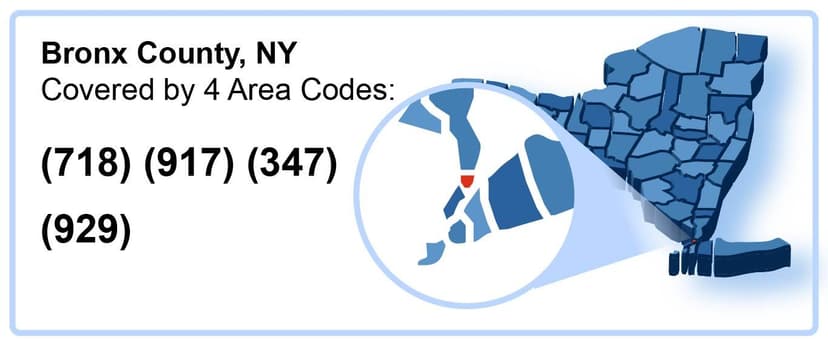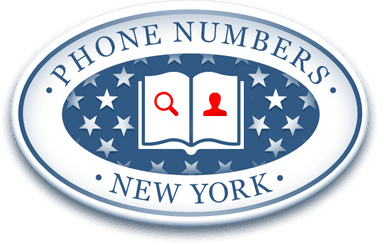What are Bronx County Area Codes?

Area codes are the first strings of three-digit numbers in American phone numbers. Area codes for Bronx County uniquely identify Numbering Plan Areas (NPAs) within the county. Like other area codes, these were established by the North American Numbering Plan (NANP). The New York Department of Public Services (DPS) is responsible for maintaining and implementing area codes in Bronx County.
There are currently four active area codes in Bronx County. These are:
Area Code 718
Area Code 718 is a New York telephone code that serves The Bronx and some other counties in New York City.
Area Code 917
Area Code 917 is a telephone area code in the NANP for the five counties of New York City. It overlays all the NPAs within the city.
Area Code 347
Area Code 347 is an overlay code for the 718 NPA. It became active in 1999.
Area Code 929
Area Code 929 is an overlay for area codes 347 and 718. It was implemented in April 2011.
What are the Best Cell Phone Plans in Bronx County?
As revealed in a survey by CDC in 2018, many households in New York no longer choose landline as their preferred means of telecommunication. For the total adult population (above 18 years), an estimated 38.8% solely used wireless telephony services. In contrast, 6% of this group used landline-only services for telecommunication. Similarly, children (below 18 years) who used wireless-only telephony services accounted for 45.9% of the total child population in New York households. Only 2.9% of them exclusively used landline services for telecommunication.
Phone carrier network services are generally impressive in Bronx County. The four major phone carriers, AT&T, Verizon, T-Mobile, and Sprint, provide varying extents of coverage in The Bronx. AT&T offers the least coverage with network signal in 74% of the city, while T-Mobile and Sprint provide 92% and 76% coverage respectively. Verizon's coverage of about 94% is the best.
Several companies that provide Voice over Internet Protocol (VoIP) telephony service as an alternative to traditional phone services offer these services to Bronx County residents. VoIP facilitates telephony services over the internet at affordable rates and are more convenient than traditional alternatives.
What are Bronx County Phone Scams?
Phone scams are frauds conducted using phone services and targeting unsuspecting individuals. Phone scammers employ varying tactics to rip off their targets and steal money as well as personal and financial information. In some cases, scammers pose as representatives of legitimate companies and appear friendly. In other cases, they pretend to be government employees and instill fear in their targets with threats. It is possible to avoid falling victim to phone scams using reverse phone searches to look up information on suspicious callers.
Among its many duties, the New York State Division of Consumer Protection (DCP) educates residents against phone scammers’ ploys. It also provides residents with scam alerts and tips to avoid scams. Persons who believe they have been victims of telephone scams can complain online to the DCP or report by calling (518) 474-8583. Similarly, victims can file their complaints online with the FTC.
Common ploys employed by phone scammers in Bronx County include:
What are IRS Scams?
Scammers pose as officials the Internal Revenue Services (IRS) to deceive unsuspecting residents. They spoof their phone numbers to make the caller IDs on the victims' phones display the IRS number. In most instances, they instruct targets to pay up the money owed for back taxes or risk punitive actions. They demand payment through wire transfers and preloaded debit cards and push victims for prompt closures. Sometimes, the scammers request that the unsuspecting victims provide their personal information to steal their identities.
It is possible to uncover the identity of a scam artist by using a reverse phone number lookup. The IRS warns residents that its officials will not demand payment nor ask taxpayers to confirm personal details over phone calls. To verify if they owe taxes, residents can call the IRS on 1 (800) 829-1040. If you believe you may have fallen a victim of IRS scam, report to the Treasury Inspector General for Tax Administration on 1 (800) 366-4484. You can also file a complaint online with the FTC. Make sure to tag the complaint by writing "IRS Telephone Scam" in the comment section.
What are Grandparent Phone Scams?
This type of scam targets senior citizens in the county. Fraudsters pretending to be targets’ grandchildren call and claim to be in desperate situations. In other cases, fraudsters pose as lawyers, doctors, or the arresting officers calling to help out the grandkids in dire straits. Search engines that provide reverse phone lookup services can help you find an answer to the question, "who is this number registered to?"
These scammers usually request that the grandparents transfer funds via wire transfer to remedy the situations described. A lot of senior residents have lost savings to these scams. The State's Division of Consumer Protection warns residents to be wary of telephone calls requesting money to get their relatives out of trouble. Residents should always verify the callers' claims when they receive such calls. Residents who have fallen victim to these scams can report them at their local NYPD precincts. They can also file complaints online with the FTC.
What are Social Security Scams?
If you receive a call from someone claiming to work for the Social Security Administration (SSA), a quick reverse number lookup can confirm the caller's claim. Many residents have fallen victim to social security scams. Scammers call unsuspecting targets, purporting to be employees of SSA, and inform them that their SSNs were flagged for illegal activities and are compromised. They ask for personal information under the pretense of providing assistance and get targets to confirm their social security numbers (SSNs). Scammers use the information obtained from their victims for identity thefts.
In another variation of this scam, fraudsters request payments from their targets to resolve their SSN issues or provide them with new ones. They demand that their victims pay for this help with wire transfers, cryptocurrencies, and gift cards. The SSA warns that its officials do not conduct official business over the phone. Do not make payments nor divulge personal information to anyone over an unsolicited phone call. You can report the details of such phone calls to the Office of the Inspector General.
What are Chinese/Parcel Phone Scams?
A scammer impersonating an employee of the Chinese consulate informs the target of some documents meant for them that need to be picked up. In the process, the call is transferred to another person who claims to work for a courier company. The courier then claims that the parcel is related to a criminal case under investigation that affects the victim's immigration status. The call is transferred again to a third person who poses as the police officer investigating the case. The police officer talks about a money laundering case linked to the victim's name and offers to close the case but demands money.
Con artists engaging in this type of scam typically request payment by wire transfers. The Chinese consulate warns immigrants against falling for this scam. Using reverse phone lookup services may not fetch the scammers’ identities, but can help identify if the callers’ IDs are spoofed. The best way to respond to these situations is to hang up and verify the callers' claims by directly contacting the consulate office. Residents who have fallen victim to this scam can report to the FTC by calling 1 (888) 382-1222.
What are Robocalls and Spam Calls?
Robocalls are telephone calls that deliver pre-recorded voice messages. Scammers use robocalls to defraud unsuspecting residents and steal confidential information. They may spoof Caller IDs to make their calls appear to be coming from legitimate organizations. Many residents of Bronx County have fallen victim to robocall scams. Residents who receive unsolicited calls can run the phone numbers used through reverse phone lookup applications to identify robocallers.
If you receive a robocall and suspect it as fraudulent, the best steps to take are:
- End the phone call. Do not act on prompts given during the call but hang up the telephone.
- Contact your phone company on call blocking options and use the options that are appropriate for you.
- Run the robocall’s phone number through applications that provide phone number lookup free services to identify robocalls and block them.
- Enroll your phone number on the FTC's National Do Not Call Registry to stop unsolicited phone calls.
- Report illegal robocalls to the FTC online or call 1 (888) 382-1222.
The FTC provides a guide on how consumers can block unwanted calls on any platform.
How Can You Spot and Report Bronx County Phone Scams?
Many Bronx County residents fall victim to scams because they are oblivious to the various schemes employed by phone scammers. It is possible to uncover phone scammers' identities by reverse phone lookups, but the best way to combat phone scams is to learn about them. Signs that a phone call is a scam include:
- Scammers want victims to pay via wire transfers, cryptocurrencies, and gift cards. No government agency or legitimate business will request payments via these unusual channels.
- Scammers impersonate officials of government agencies and coerce targets to provide personal and financial information. Government officials will never ask residents for such information over the phone or use threats to obtain them.
- Scammers pressure victims to make commitments quickly. They imply the offers and requests are time-sensitive, and the targets will lose it all if they delay.
- Scammers offer attractive prizes and gifts. They then request upfront payments before the recipients can receive these offers.
To curb phone scams, consumer protection agencies educate residents on scam artists’ different tactics. They also provide platforms for reporting cases of phone scams. Using search engines that provide reverse cell phone lookups helps to find information on unknown callers’ identities. Agencies involved in consumers education and protection include:
Federal Communications Commission - The FCC protects residents by educating them on how to avoid scams. They also implement policies to fight frauds and protect consumers. Residents who fall victim to phone scams can report online to the FCC.
Federal Trade Commissions - The National Do Not Call Registry is an initiative of the FTC that helps to protect residents from unsolicited calls. Residents who have enrolled their numbers but still receive unwanted calls should be cautious. If you have fallen victim to a phone scam, report the incident to the FTC on 1 (888) 382-1222 or file an online complaint.
New York State Division of Consumer Protection - The DCP educates residents on the various schemes employed by scammers and how to avoid falling victim. They also provide consumer alerts to keep residents informed. Bronx County residents who fall victim to phone scams can file complaints online with the DCP.
New York Police Department (NYPD) - The NYPD is the primary law enforcement agency for Bronx County and New York City. Residents can file reports of scams and frauds at their local NYPD precinct.
